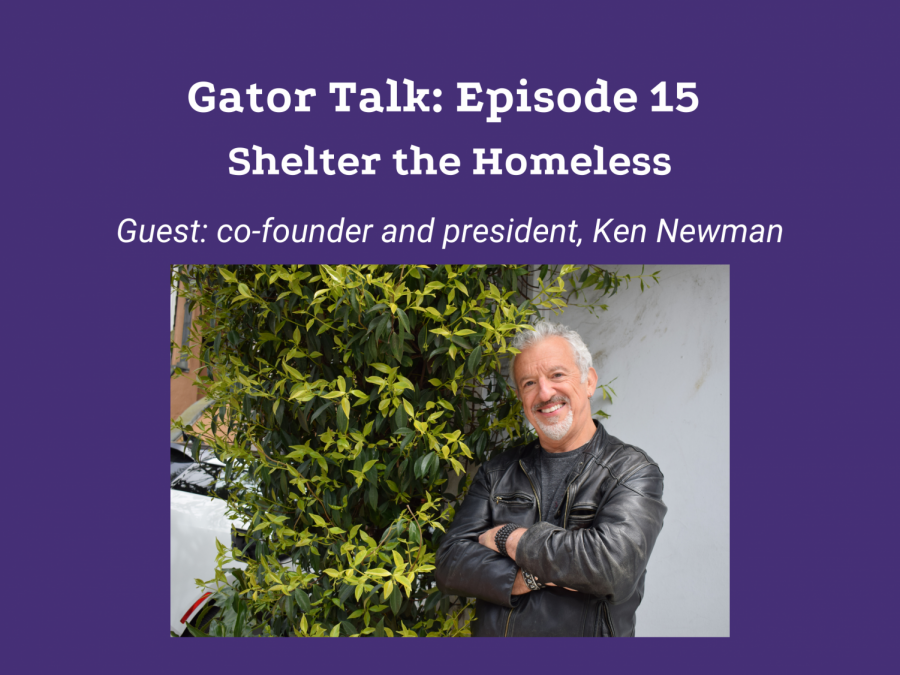Welcome to Gator Talk, a collaborative CalState podcast that brings city and statewide perspectives to SF State news.
In this episode, guest host Sean Watkins sat down with Ken Newman, co-founder and president of Blanket the Homeless, to discuss his organization and how they provide for the homeless, as well as the issues the city of San Francisco continues to face regarding its massive homeless population.
TRANSCRIPT:
Intro
*salsa song fades in*
Chris: Hi everyone, this is Chris Ramirez, editor-in-chief for Golden Gate Xpress and your fill-in host for Gator Talk, a Golden Gate Xpress podcast that brings news to SF State students. I’ll be filling in for Sebastian, who’s out sick after getting his second dose of the Covid vaccine. Hang in there, Seb!
For more information/coverage, check out goldengatexpress.org OR @GatorTalkPod on all social media platforms.
Preview of the show
Chris: Here’s a quick preview of the show.
I’ll be updating the audience with a quick news brief with news that happened this week that matters to SF State students.
Sean Watkins, city news writer for the Golden Gate Xpress will be leading on for the main story. He’ll set the scene up!
News brief
– Caityln Jenner said in an interview she’s watched California “crumble” and that her friends are leaving California due to the rising problem with homelessness in the Golden State. She is one of the candidates who will be running for the Calif. Governor seat, running against Gov. Gavin Newsom in a recall election held this November.
Up north in California, the city and county of San Francisco is now in the Yellow Tier which means indoor bars, breweries and wineries may open at 25%, 3 person seating at an indoor restaurant is now lifted to allow 8 per table, and if you’re full vaccinated you don’t have to keep your mask on if you’re away from a big group. If you still haven’t received your vaccine, please schedule an appointment!
The US Drought monitor update shows that 73% of California is listed as Extreme Drought. Gov. Gavin Newsom officially declared drought Mendocino County and Sonoma County in April
Main Story
Sean: My name is Sean Watkins, I’m a city news reporter of Golden Gate Xpress.
I am here today with Ken Newman, co-founder and president of Blanket the Homeless, to discuss his organization and how they provide for the homeless, as well as the issues the city of San Francisco continues to face regarding their massive homeless population.
Sean: Do you feel a personal connection with the people that you provide for? Can you explain what it means for you in regards to helping those in need?
Ken: You know it’s a funny question. I mean it’s a great question. My girlfriend manages a building right at the edge of the Tenderloin, and so I’m with her quite often. On many occasions, I’ve literally stepped over somebody with a needle hanging over their arm asleep. Right. I’ve offered to buy a meal for somebody. And because I didn’t buy one for their companion, I got chased down the street by somebody screaming at me threatening bodily harm because I didn’t help them because I have to draw the line someplace I mean, my business was seriously impacted by COVID so I didn’t exactly have a lot of disposable income, so there are times where I am in that uncomfortable position of offering help to a community. Some individuals within that community want to physically attack me and make me question oh god like, what am I doing, this is insane. You know I’m risking life and limb and why. The way I solve it is like, I can’t think of them as a community of people, it’s not, you know any more than you can say whatever you know, pick your race. For me to deal with some of that fear, some of that reluctance to continue the work I do, it is exactly what you’re saying it’s about the person I meet.
I got a phone call from a woman who said hey I don’t know if you can help me but my husband and I are freezing. We have a tent we’re over by the encampment at 14th and Duboce. I saw Blanket the Homeless, you guys have blankets? I mean I could try to cover the money together and get an Uber or something. Get over there, pick up a blanket. She said you know it’s gonna be really cold tonight I said yeah I know I know it is. I said, You know what, I do have something. Where are you, and she said it’s a red and grey tent. I said what if I’m there, I don’t know what time 3:15 She said, Oh God, that would be great, I’m sure she hung up and thought you’ll never see me, why should she have any hope when her hopes have been dashed God knows how many times. Sure enough, there’s a red and gray tent. I pull off, safely out of harm’s way. And I see this mask face and these little eyes peering through the tent with a pitbull on what I hoped was a very strong leash. And it didn’t look particularly menacing, it just looked like a pit bull, which in and of itself can be pretty dramatic. So I said, Hi, I’m Ken she said, oh my gosh you’re here I said Yeah, yeah, I said, Would you do me a favor. Can I, can I ask you to distribute these? I mean there’s plenty in here for you, you and your husband can each have one of the bags, you have a couple of but there’s some really really soft cushy blankets here and as a jacket that will fit one or the other of you, I think, I can see your eyes smiling and you know kind of the dog chained to the fence, you know, a little hard, you know symbol on her chest and that was it. That was my connection with her and you know I don’t think I’ll see her again. I mean I did last I drove past that way the tent wasn’t there so they’re probably someplace else but, I mean that is the connection they’re random. But they’re enormous, and I, I always tell people I said this is the thing that you won’t believe until you do it. The experience of giving this thing away whatever the hell it is, even if it’s just a Hello good morning, very often will give you more than it gives them, or at least as much.
Sean: So, have you noticed an increase in the homeless population over the past few years, and if so, how much of this do you think is directly related to the pandemic, and what’s kind of like your current progress with your organization during this time?
Ken: It’s, it’s a hard thing to answer because I mean I don’t you know I haven’t really done the research to figure it out. I mean there has been a consistent increase. I don’t know if that continued at the same rate starting in the beginning of 2020, but I mean I moved to San Francisco in 1980. I never saw anything like what’s happening now, but then again my apartment on Russian Hill was $375 a month, that same apartment right now is probably about six grand. So, you know, when you consider, okay 375 a month I was still able to get tech work done in the financial district of $14 an hour 40 hours a week just figure it out. I mean this percentage of rent versus this much gross income. And now what you’re paying for rent is roughly comparable to that much gross income, so most of your money is going. You lose one or two paychecks and you’re in arrears. That’s it, you’re on the street. And so it’s that easy. So, between skyrocketing rents, and some businesses closing particularly during the pandemic and an absolutely horrific problem with you know with drug abuse. And, I mean I don’t want to get super political but you know there’s just a lot of stuff that the police are not able to enforce because they know that it’s just going to get thrown out, you know, they just they can’t, they can’t patrol these areas, a policeman will literally step over somebody with a needle in their arm because there’s something else they have to deal with. They can’t deal with this, you know there’s simply too many and not enough police and the mechanism isn’t in place to really deal with it. In fact in kind of an ironic way. When the pandemic hit, and there were a lot of different things that they were trying to do because they realized that having a lot of homeless people on the streets spreading infection could have been more catastrophic than it already was, they were offering hotel rooms and seeing if they could take people and put them in vacant hotels, or get people to encourage people to come into the shelters or the navigation centers and so, in some instances I would look around and go like, do my imagination or less people on the street, you know total, but then you would go to the areas where they would mostly be and then you would see tent to tent to tent to tent to tent everywhere. I mean anywhere that was, available space for it so the last I checked, I mean I think the number was somewhere in the neighborhood of 10,000 people on the streets in San Francisco, and, you know again it’s, serious drug problem a lot of people dealing with, with methamphetamine, you know a lot of problems with fentanyl and people dying from fentanyl overdoses because they’re cutting that with other drugs. There are people on the street that weren’t on the street 18 months ago that lost their jobs during the pandemic, so I’m seeing people on the streets that are the clothes are a little bit higher quality then whatever possessions they have are not quite as time-worn, which suggests that their new addresses a relatively short-lived one.
Sean: San Francisco provides a massive amount financially for the homeless. Do you think these funds are being directed the right way? Can you elaborate on that?
Ken: I wish I could answer that a little bit more intelligently. There was a lot of discussion about Prop C, which was a major homeless initiative that was on the ballot, not most recently but a while back maybe two years now. And the big, big pushback against it was oversight. What are they going to do with the money? How is it going to be used? What organizations are going to be supported? It’s one of the reasons I wanted to do Blanket the Homeless. As bare bones as possible, with minimal administrative costs. I mean it’s a cliche but that everything gets lost in red tape, bureaucracy, you know, it’s, oh yeah well we have this much money to play with. And the pots that big, and the piece that actually goes to do any good. Is that and the rest of it is just meetings and focus groups and whatever positions of people getting salaries that they shouldn’t be getting for the work that they’re doing. But, so I really don’t know, I think that’s, I mean, to that point, that’s something that I really do want to find out about particularly as we’re coming out of this. I really do want to know where that money is going, because quite honestly I mean if they just said okay here a client with all of us we got all this money. Here’s $500,000 See what you can do with it. I know what we could do with it. I know exactly what we could do. I know how many of these things that would buy. I know how many more people, you know I would put a few people on permanent payroll, I would get people basically working with the San Francisco homeless, the Homeless Coalition, a Coalition on Homelessness in San Francisco, and other organizations and sit down and say okay what do we do, let’s give ourselves, you know, 12-month timeline, what do we want to accomplish at the end of December, at the end of January, at the end of February. How many people do we want to reach? It’s not like well we have to kind of decide we got to break ground we got to build a facility we got to do this, we got to do that, you know there needs to be an education, there needs to be at one point we were I was talking with a bunch of other musicians so people need to be educated on first of all, what, what the navigation centers are there was this misconception that they were like well like I have halfway house and open doors and people running around with drugs and needles and, and this is scary, kind of blight on the neighborhood like, no, that’s not what it is, but people don’t know that because, well, as a society we’ve kind of lost our ability to do critical thinking so you know nobody reads about stuff, nobody finds stuff out, we just kind of like assume whatever we saw on a billboard or whatever popped up on Twitter or Fox or any, you know, pick your news organization. Oh, that’s what’s happening. Oh my gosh, No, we don’t want that or something that somebody overheard somebody tell their cousin’s best friend. That’s what’s happening. So, when you realize that there are these organizations in place and they’re doing great work, and they’re worthy of your support, that’s part of what needs to be done. So part of it is marketing, it is getting the word out to people you know who might actually be sympathetic and generous enough to be helpful in the right way. You know that aren’t those that don’t have the experience the only experience with, with somebody living on the streets is being chased, or scared, you know, or walking, looking over their shoulder as they hustle back from the BART station.
Break
Chris: We’re going to take a quick break.
Support the Golden Gate Xpress’ work by signing up for our online newsletter, following us on Instagram or Twitter @ GGXnews, and visiting the website: https://goldengatexpress.org
Interested in advertising with GGX? Check out our advertising page on goldengatexpress.org/advertising.
*break ends*
Main Story cont.
Sean: Are you aware of the homeless encampment that got cleaned out in Echo Park in Los Angeles?
Ken: I did read about that. Yeah, yeah, exactly. I mean that’s the thing, it’s like, and you know a lot of neighbors go like a blast, as if those people just suddenly are materialized like you know a bunch of people in Star Trek they push the button just like a beam to another community. You know the thing about San Francisco is it’s 49 square miles. Then a big seven by seven. You know, you take eight 910 1000 homeless people sticking on a plot of land 49 square miles, you’re gonna notice, you know, you put them in a much bigger area, you don’t notice them as much. So when we had the Super Bowl event down in San Jose, and they were really really freaked out at the prospect of too many homeless being down around the Embarcadero or any kind of the nicer neighborhood so everything was pushed and they were virtually all pushed into the Tenderloin where, as I mentioned my girlfriend has a building, and we suddenly saw where there were two people on a block, there were 15, intense and people in the streets and stumbling across the street in the middle of the night completely out of their minds. You know so yeah it was a nightmare for a while and you know, a huge uptick in violence and car break-ins and whatnot because you take, I mean you take a community that manages to spread itself out to the best of their ability into different neighborhoods and they can have at least many communities, you know, and you stick them in, you know, I mean, look, you know, look. Take a zoo, take a whole bunch of animals, put them in a small cage, see what happens. You take a whole bunch of people, it doesn’t matter whether they’re living on the street, you know it’s one thing to have, like, 45,000 People in a stadium and join a rock and roll concert, you know, keep them in the stadium and close the door. You know after the music stops and let them stay there for about four months, see how that goes. I mean what happened in New Orleans, with all those people in the thing in the stadium, you know, trying to deal with Katrina I mean you put people in close proximity to each other, and society breaks down. You know you do that in the homeless population with people that are already so deeply compromised by everything, you know, no money, they’re hungry, they have drug issues they have mental health issues, you put them on top of each other, you know, that’s a powder keg, you know, but the city, the city, meaning you know doesn’t think about that, it’s like, well as long as we don’t see it over there.
Sean: I see how much money is being given to these organizations or programs to help the homeless but it all just seems kind of misguided, like I don’t know if they are using it the right way.
Ken: Yeah, to be quite honest, that question made me want to do a little bit of my own due diligence, I really want to do some research on that I want to find out. You know I’m going to talk to my friends at St Vincent DePaul society and a very dear friend of mine who’s still at Compass Family Services and they just do, they do amazing stuff I mean they’ve got a childcare center on the roof of the building I’ve played music up there and done magic up there for the kids, they’ve got, you know great counseling services for families I mean they really are, you know, taking a deeply humanistic approach and they’re smart business people, I mean they own the building where their facilities are so they don’t have to worry about skyrocketing rents sucking up their capital, you know, and still they’re you know, they’re, they’re struggling, you know, they’re looking to big corporations and looking to fundraisers, you know, some of which had to be canceled because of this pandemic, you know, big events that you know that I’m hoping to be a part of as we move forward. But yes, we need to talk to them, I need to talk to some of the other smaller organizations and say, do we know what’s happening with all of that money? And if we don’t have oversight, if we can’t get that information, then how do we make some noise and get it, you know, because the voters and the people who voted that in, they have every right to know. You know where that money is going, and is it doing any good or is somebody just getting to take a trip, you know, and, you know, lining their pockets with it. That’s a good question. I’m glad you asked.
End
Sean: And that was the episode.
This was Sean Watkins, City news reporter from Golden Gate Xpress and guest host for Gator Talk.
New episodes will premier Friday mornings so stay tuned.
And with that, I’m signing off.













